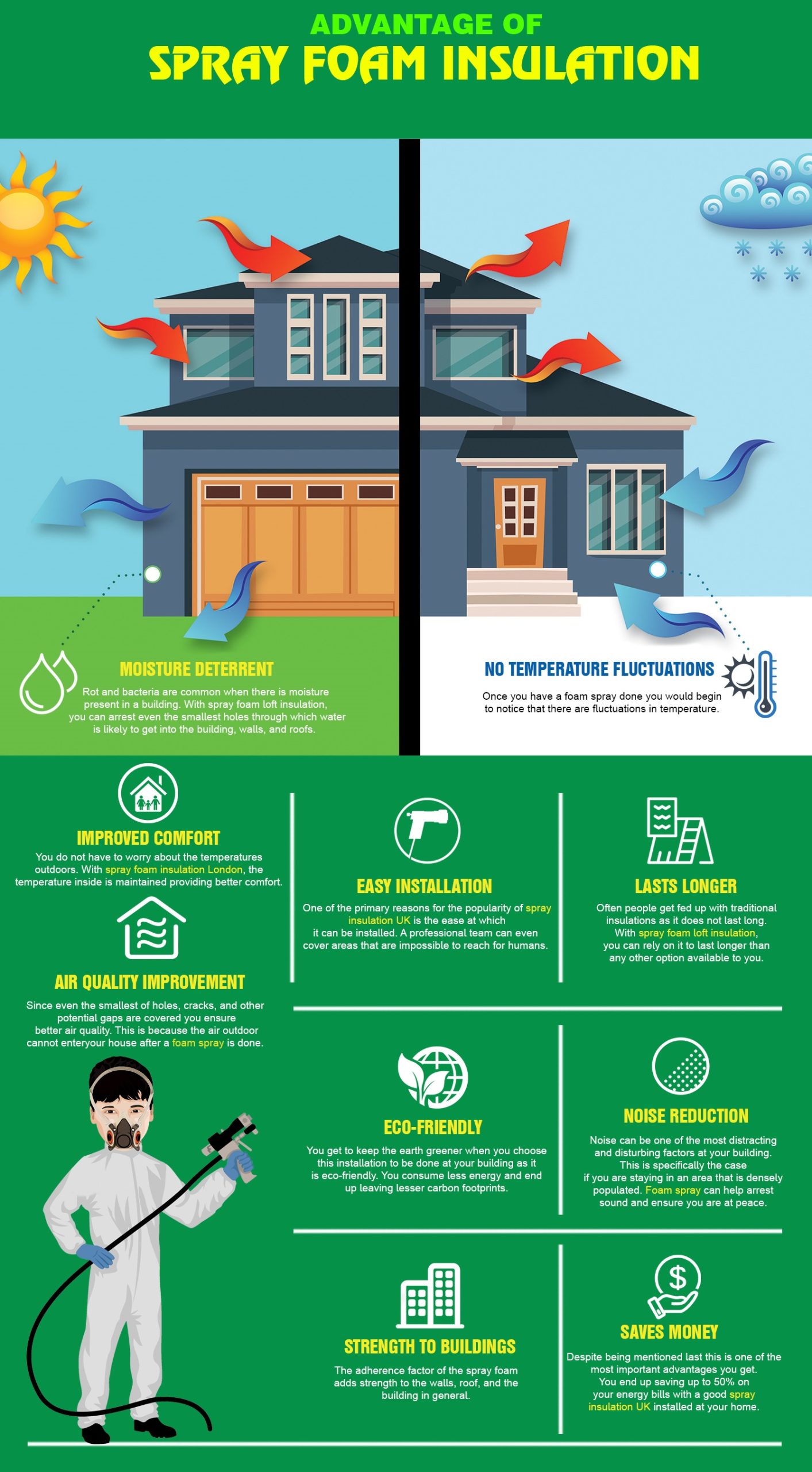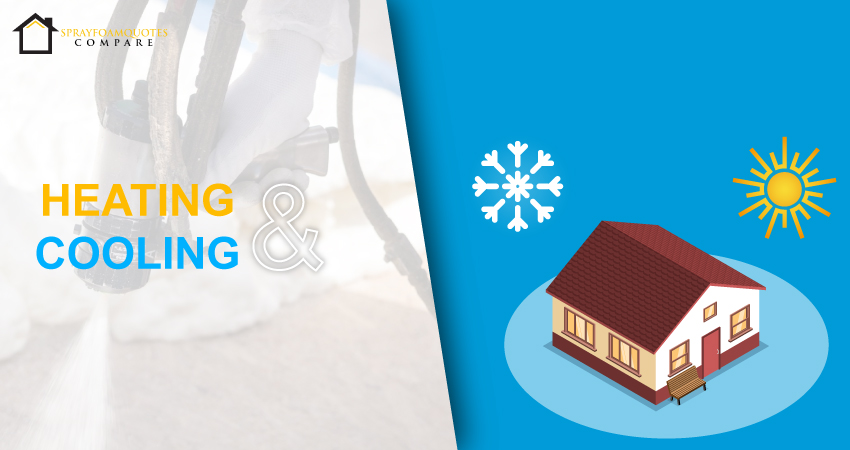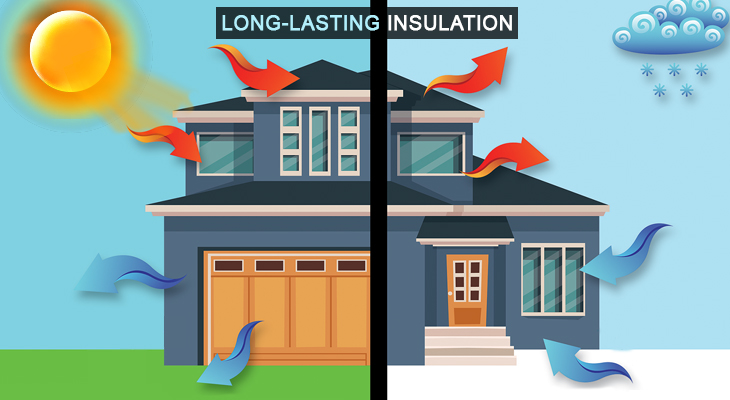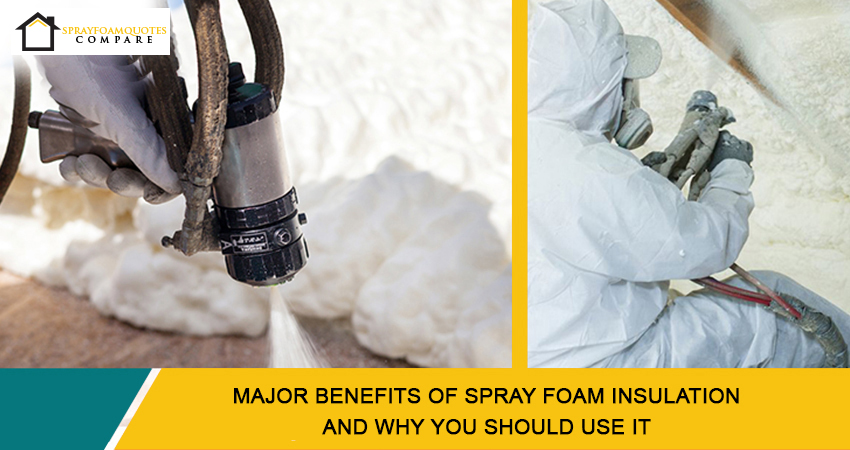Whether you are looking to insulate a brand new building or you want to upgrade an older one, spray foam insulation could be the thing you need. Ideal for both older and newer buildings, they will benefit from spray foam insulation either way. It’s always worth looking into the benefits of choosing to install spray foam insulation, especially as there are two types of insulation available depending on the needs of your home. Let’s dive in!
Types Of Spray Foam Insulation
- Open Cell Insulation: If you are looking to learn about spray foam insulation, it’s best to start with its types and the first is open cell insulation. It’s cheaper and better at blocking out the noise, but it does tend to be more spongy due to the air that gets trapped inside the cells.
- Closed Cell: Closed cell foam insulation works at keeping the air or water from penetrating the walls of the home, and is more rigid than open cell insulation.
Benefits of Spray Foam Insulation

One of the benefits of spray loft insulation is that it is sturdy; the structure of the house has more integrity as a result. Foam will fill the cracks properly, with the attic better protected from water even if a storm rips off the roof. Below, we’ve put together some of the major benefits of spray foam insulation.
Heating and Cooling

Spray foam insulation is unique in that it can get right into the tiniest of crevices. Once the foam has been applied to the cracks, it expands out and quickly dries, and while it does this it blocks both air and water from the inside of the wall. Not only this, but it works to trap both hot and cold air. The use of spray foam insulation could save you money on your heating bills, and it will keep your home further protected from the colder air penetrating the house in the winter months. The investment that you make in the right spray foam insulation is worth it, as you will save money on your bills in the long-run!
Reducing Noise

When you move into a new property, the last thing that you want to deal with is the noise pollution outside. From the noise of the adjacent neighbours, to children playing out too late or too early. Partying neighbours, trucks zooming up the road and even the incessant noise from seagulls are all going to drive you crazy, but with spray foam insulation, you can avoid being disturbed. Open cell spray foam insulation is going to reduce the noise more than any other type of insulation out there.
Reducing Allergens
Did you know that many of the allergens from the outside world that fly into the house do so because of a lack of insulation? One of the biggest benefits of spray foam insulation is the reduction in pollen and other allergens coming through the walls of the house. Spray foam insulation gets right into those crevices and cracks, preventing the air from penetrating the walls. As this air is laden in pollen and allergens, it makes sense that spray loft insulation UK will slow it down. By reducing the allergens in your home, you can suffer less through the Spring months and stop sneezing!
Reducing Pests
Spray foam insulation makes it into the tiniest of cracks and spaces in the walls of the home. When you have spray foam insulation installed in the walls, you prevent tiny bugs and insects from getting inside the house, too. This is true for larger rodents like mice! Closed-cell spray foam insulation is the best option to prevent pests, as it creates a harder barrier to prevent any pests from digging through. Remember, closed-cell spray foam insulation is solid and not spongy, so digging through it is not going to happen. This leads to fewer infestations in the house, fewer chances of sickness because of the droppings in the building, and no waste being left around the premises.
Mould Prevention
Any spray foam insulation is going to prevent moisture from seeping through the walls of the house, no matter how hard the rainfall outside. Rising damp is a big problem for a lot of houses but with the right spray foam insulation, this is going to be prevented. No mildew can fester in a space if it’s filled with the right spray foam insulation. The less water seeps through the wall, the smaller the mould risks inside the home. Mould can cause huge issues in the walls of the house, and if you aren’t more careful about the spray foam insulation in the house, you will find the house covered in mould.
Protect the Environment
 Spray foam insulation provides high-performance solutions for efficient building envelopes, thermal comfort, and a healthy indoor environment in London.
Spray foam insulation provides high-performance solutions for efficient building envelopes, thermal comfort, and a healthy indoor environment in London.
spray foam goods are entirely made of water. They don’t contain synthetic blowing agents like HFCs, which are commonly found in other spray foam products and are regarded to be highly high-GWP gasses.
There are no PBDEs in spray foam products. This is a potentially hazardous flame retardant that can impair building occupants’ health. Foam insulation can save you up to 50% on your energy bills. As a result, it aids in the reduction of greenhouse gas production, such as carbon dioxide, by thousands of tonnes per year.
Spray foam insulation retains its performance over time and does not lose its R-value. It gives total thermal comfort now and in the future, whereas traditional insulation might deteriorate with time and no longer work as well as it did when first placed. Selecting products with a long lifespan, such as insulation, can potentially obviate the need for future material installation/re-installation.
Structurally Sound
Did you know that the walls of your house are going to be sturdier if you choose to use spray foam insulation? Spray foam insulation is dense and due to this, spray foam insulation can strengthen the structure of the walls of your home. There are a lot of regulations and building codes that a home has to live up to, and yet these regulations don’t consider how natural circumstances can affect a house. When a house or commercial building is planned, the walls are required to meet a minimum load bearing standard, and this can be affected with strong winds, heavy snow and earthquakes. Spray foam insulation gets into the cracks and holds everything together – similarly to strong glue!
Long-Lasting Insulation
 One of the biggest benefits of spray foam insulation is in how long it can last. Fibreglass is not a long-term solution even if it is one of the most common solutions around. Styrofoam is also not a long-term option as it can break over time.
One of the biggest benefits of spray foam insulation is in how long it can last. Fibreglass is not a long-term solution even if it is one of the most common solutions around. Styrofoam is also not a long-term option as it can break over time.
The benefits of spray foam insulation are many and it should all come together to convince you that the best spray foam insulation out there is going to change the way in which your home functions. It protects in the winter from the cold and wet, and it protects in the summer from the heat and pollen.
Also More Query
Can Spray Foam insulation be applied in hot weather?
The best time to apply spray foam insulation is in the early summer. Spray foam insulation installation procedures become significantly more difficult as soon as temperatures begin to fall or during the winters. Application average temperature normally has to be between 60 and 80 degrees Fahrenheit for a good spray foam insulation installation. It is more likely that machinery may malfunction and that foam will pop, shrink, and not cling to surfaces effectively if temperatures are well below this range or rise more than the stated value. The maximum temperature for the application of spray foam insulation is 180 degrees Fahrenheit. Hence it cannot be applied in extremely hot weather.
Is Spray Foam Insulation a good idea for your home?
Spray foam insulation might be worth the extra expense to you if you can see the advantages of properly insulating your new construction home from the beginning for extreme comfort, savings on energy bills, moisture reduction and acoustic benefits that add to the overall value of your home. It is the best choice for your home as it makes a thermal envelope that is incredibly energy-efficient, and offers exceptional thermal properties with less recurring energy bills.


